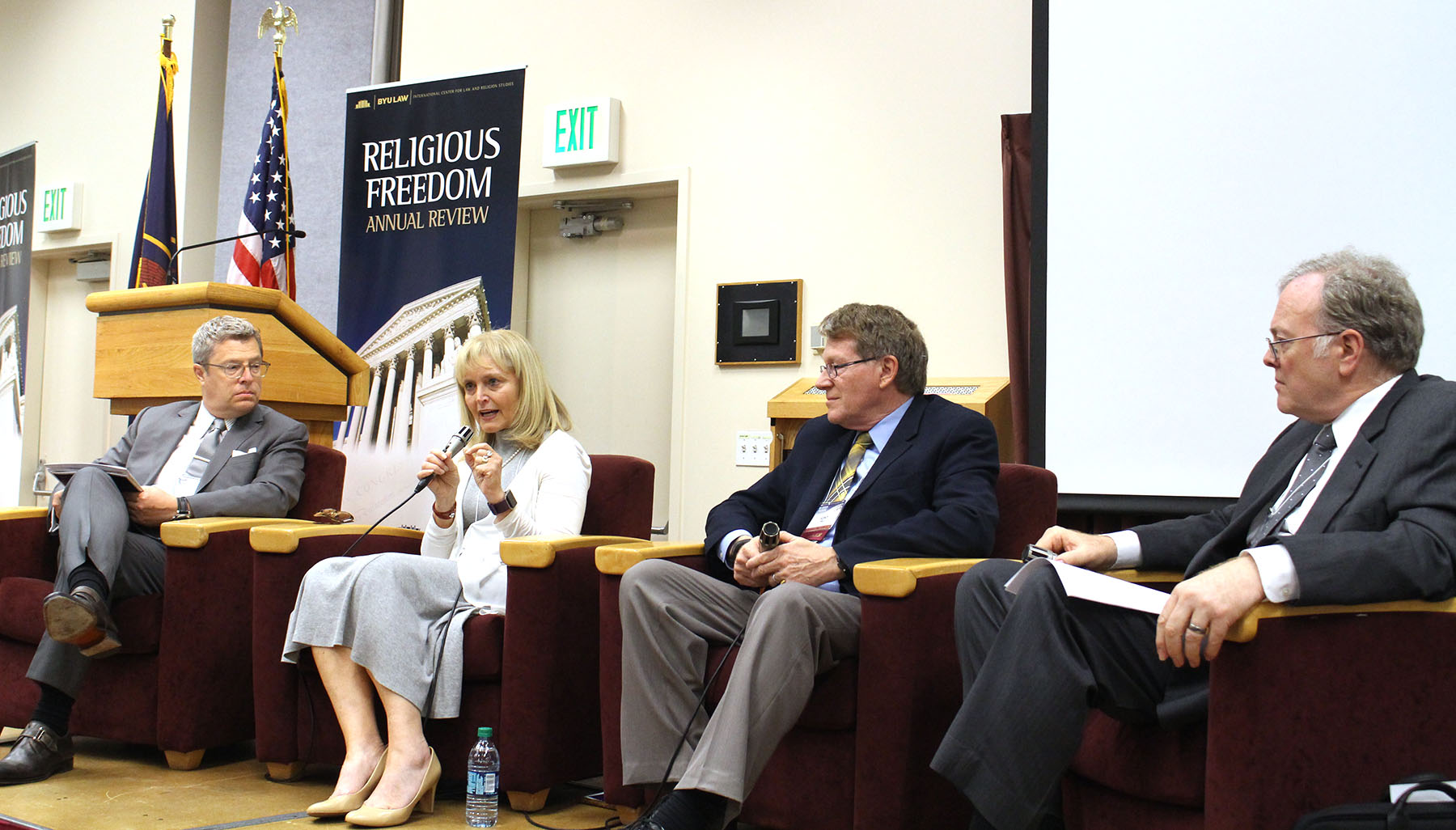General Session: What Can Make a Difference in Promoting International Religious Freedom? – Lantos Swett, Durham, & Hill

by Justin Miller, 2017 ICLRS Student Fellow
Professor Brett Scharffs moderated an International Religious Freedom panel comprised of Katrina Lantos Swett, President, Lantos Foundation for Human Rights and Justice and former U.S. Commissioner for International Religious Freedom, Kent R. Hill, Executive Director, Religious Freedom Institute, and W. Cole Durham Jr., Susa Young Gates Professor of Law and Founding Director, ICLRS, J. Reuben Clark Law School, BYU.
Scharffs opened the discussion with a question about each individual’s personal involvement with religious freedom. Lantos Swett began by focusing on her legacy as the daughter of two Holocaust survivors. She recounted their experiences in leaving Hungary with the aid of Raoul Wallenberg, a prominent Swedish diplomat who also happened to be Christian. The experience of having someone who made common cause with those with whom he had little in common saved their faith in humanity.
Hill began his involvement when he noticed persecution of Pentecostals in the former Soviet Union. He noted that Tom Lantos inspired him as a young president of a religious freedom NGO in Washington, DC.
Durham’s interest began when he wrote a paper during his third year in law school on German religious freedom issues. He continued his involvement as secretary and then chair of the Law and Religion Section of the American Association of Law Schools. Shortly thereafter the Berlin Wall came down, and he realized that there would be immense opportunities in helping to help with religious freedom law reform.
Scharffs next question was what the big, pressing issues of religious freedom are in the world today. Durham noted that there are 65,000,000 refugees and displaced persons in the world today, the largest number in history. He also noted the deregistration of the Jehovah’s Witnesses in Russia, and the arrest of three of the top five leaders of Scientology in Russia. In the long term, registration of religious organizations could continue to be a problem area as well.
Hill noted that any area that is deprived of its minorities poses a danger to its own citizens and its neighbors. Pluralism is vital, especially in the Middle East. In addition, he noted that human dignity must be seen as a natural right.
Lantos Swett spoke about the dangers of secular states like China and the strange situation of North Korea where religion freedom is very restricted, but the ruling family is held in a semi-deified regard. She noted the importance of avoiding preconceived notions, commenting that one of the most persecuted minorities in the world is the small Muslim community in Buddhist Burma. She theorized that our society’s focus on materialism and secularism leaves a gaping hole in people’s lives that, if left misunderstood, leaves us unable to communicate with the rising generation.
The next question regarded what the response of individuals and groups should be in a world where there are no majorities, just minorities.
Hill noted that the hole affects not only the “nones,” but believers overall have lost much of their passion for religious freedom. In order to speak the language of the world, the only effective communication is a sincerely lived religious life; nominal beliefs are not convincing.
Durham said that a great responsibility rests on religious leaders to build bridges with other faith communities and set the example. Religious people must further deepen and articulate their world views.
Lantos Swett recounted a story about when her hometown invited Egyptian Coptic leaders to a religious dialogue. She realized that the dialogue’s tone was not of reciprocal respect, but by sharing stories about her family, the walls broke down and they were able to find common ground.
The closing question came from the audience regarding what to expect in the next ten years for religious freedom. Hill responded that a natural response is to despair, but despair is not a Christian virtue. We must each play our part and do what is within our possibilities. Lantos Swett said that we need to realize that we can make a difference. She quoted Shakespeare’s Tempest, “what’s past is prologue; what to come, In yours and my discharge.” We should take responsibility, but be optimistic. Durham expressed the hope that more concrete ways to protect religious freedom could be developed; overall, individuals can avoid acting in zeal without knowledge. Therefore, gaining knowledge is vital.